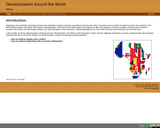
Brief overview of decolonization in Africa from the 1950s - 1980s
- Subject:
- History
- World History
- Material Type:
- Module
- Author:
- Jessica L Dowell
- Date Added:
- 03/06/2018

Brief overview of decolonization in Africa from the 1950s - 1980s
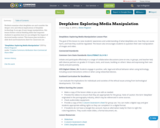
Students examine what deepfakes are and consider the deeper civic and ethical implications of deepfake technology. In an age of easy image manipulation, this lesson fosters critical thinking skills that empower students to question how we can mitigate the impact of doctored media content. This lesson plan includes a slide deck and brainstorm sheet for classroom use.
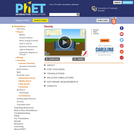
Why do objects like wood float in water? Does it depend on size? Create a custom object to explore the effects of mass and volume on density. Can you discover the relationship? Use the scale to measure the mass of an object, then hold the object under water to measure its volume. Can you identify all the mystery objects?
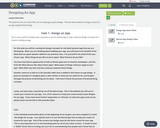
This task ties into our school PBL Unit on body apps system design. The task asks students to design screens for an app using the Marvel App.

A resource for teachers who want to create a website for their classroom. Three platforms are explored in this lesson: Weebly, Wix and Google Sites. The "why" of having a class website as well the "what" to have on the class website are parts of this lesson. In this lesson teachers will be participating in the Connect-Extend-Challenge Activity. For this activity, the teacher will consider what they have just read and seen in the lesson and then ask themself:How are the ideas and information presented connected to what you already knew?What new ideas did you get that extended or broadened your thinking in new directions?What challenges have come up in your mind from the ideas and information presented?
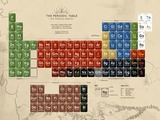
This activity is set as an introduction to the periodic table. Students will be organizing and categorizing objects or ideas of their own choosing.
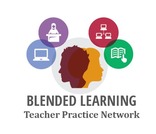
Are we teaching what we think we are teaching?""Are students learning what they are supposed to be learning?""Is there a way to teach the subject better, therefore promoting better learning?"In problem based learning, assessment needs to not only reflect the learning process but the content being learned as well.This online learning module will explore the following learning targets: •Identify how formative and summative classroom assessments are integral to instruction.•Recognize and develop high-quality performance assessments for evaluating student work.•Recognize and develop high-quality rubrics for evaluating student work.
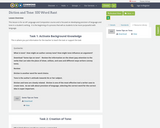
This lesson is for an AP Language and Compositon course and is focused on developing precision of language and tone in a student's writing. It is the beginning of a process that will as students to be more purposeful with language.
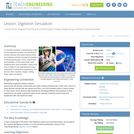
To reinforce students' understanding of the human digestion process, the functions of several stomach and small intestine fluids are analyzed, and the concept of simulation is introduced through a short, introductory demonstration of how these fluids work. Students learn what simulation means and how it relates to the engineering process, particularly in biomedical engineering. The teacher demo requires vinegar, baking soda, water and aspirin.
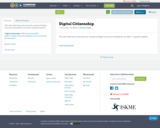
This soft chalk lesson discusses the concept of Digital Law and is intended for use with 7-12 grade students.

This lesson is designed for students in grades 3-4 and discusses some important ways to keep your private information safe on the internet

This lesson will focus on digital citizenship.
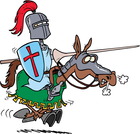
This lesson teaches children 3 rules on how they can stay safe as they navigate in the internet

How will online posts affect your future?What impact does digital footprints have on scholarships, careers?Do businesses and companies look to people’s online presence when selecting employees to hire?

This lesson focuses on the importance of formative assessment. Four resources are showcased in this lesson. Teachers need to choose at least two or three formative assessment tools on the attached list that are new to them. They will create an assessment with each tool they choose that they will use with students. Teachers will participate in a 3-2-1 Bridge Activity before they begin this lesson.
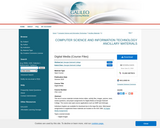
This set of course materials includes lecture slides, activity files, images, quizzes, tests, review questions, and project assignments for Digital Media at Georgia Gwinnett College. The course uses open-source applications such as GIMP and InkScape.
Individual chapters are available for download due to the large file sizes. Web-based assignments to supplement these materials are located on the GGC Wiki: All Digital Media Assignments
Topics covered include:
Digital Images
Image Processing
Audio Processing
Video Processing
Creating Animation
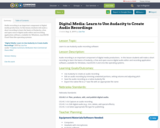
Audio recording is an important component of digital media productions. In this lesson students will make a short recording to learn the basics of Audacity, a free and open-source digital audio editor and recording application software, available for Windows, macOS/OS X and Unix-like operating systems.
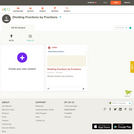
This short video and interactive assessment activity is designed to teach fifth graders about dividing fractions by fractions.
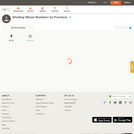
This short video and interactive assessment activity is designed to teach fifth graders about dividing whole numbers by fractions.
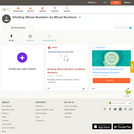
This short video and interactive assessment activity is designed to teach fifth graders about dividing whole numbers by mixed numbers.